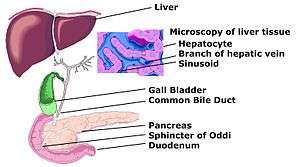Hepatology
| Occupation | |
|---|---|
| Names | Doctor, Medical Specialist |
Occupation type | Specialty |
Activity sectors | Medicine |
| Description | |
Education required | Doctor of Medicine, Doctor of Osteopathic Medicine |

Hepatology is the branch of medicine that incorporates the study of liver, gallbladder, biliary tree, and pancreas as well as management of their disorders. Although traditionally considered a sub-specialty of gastroenterology, rapid expansion has led in some countries to doctors specializing solely on this area, who are called hepatologists.
Diseases and complications related to viral hepatitis and alcohol are the main reason for seeking specialist advice. More than 2 billion people have been infected with Hepatitis B virus at some point in their life, and approximately 350 million have become persistent carriers.[1] Up to 80% of liver cancers can be attributed to either hepatitis B or Hepatitis C virus. In terms of mortality, the former is second only to smoking among known agents causing cancer. With more widespread implementation of vaccination and strict screening before blood transfusion, lower infection rates are expected in the future. In many countries, though, overall alcohol consumption is increasing, and consequently the number of people with cirrhosis and other related complications is commensurately increasing.

Scope of specialty
As for many medical specialties, patients are most likely to be referred by family physicians (i.e., GP) or by physicians from different disciplines. The reasons might be:
- Drug overdose. Paracetamol overdose is common.
- Gastrointestinal bleeding from portal hypertension related to liver damage
- Abnormal blood test suggesting liver disease
- Enzyme defects leading to bigger liver in children commonly named storage disease of liver
- Jaundice / Hepatitis virus positivity in blood, perhaps discovered on screening blood tests
- Ascites or swelling of abdomen from fluid accumulation, commonly due to liver disease but can be from other diseases like heart failure
- All patients with advanced liver disease e.g. cirrhosis should be under specialist care
- To undergo ERCP for diagnosing diseases of biliary tree or their management
- Fever with other features suggestive of infection involving mentioned organs. Some exotic tropical diseases like hydatid cyst, kala-azar or schistosomiasis may be suspected. Microbiologists would be involved as well
- Systemic diseases affecting liver and biliary tree e.g. haemochromatosis
- Follow up of liver transplant
- Pancreatitis - commonly due to alcohol or gallstone
- Cancer of above organs. Usually multi-disciplinary approach is undertaken with involvement of oncologist and other experts.
History

Evidence from autopsies on Egyptian mummies suggest that liver damage from parasitic infection Bilharziasis was widespread in the ancient society.[2] It is possible that the Greeks may have been aware of the liver's ability to exponentially duplicate as illustrated by the story of Prometheus. However, knowledge about liver disease in antiquity is questionable. Most of the important advances in the field have been made in the last 50 years.
- In 400 BC Hippocrates mentioned liver abscess in Aphorisms.[3]
- Roman anatomist Galen thought the liver was the principal organ of the body. He also identified its relationship with the gallbladder and spleen.[4]
- Around 100CE Areteus of cappadoca wrote on jaundice[5]
- In medieval period Avicenna noted the importance of urine in diagnosing liver conditions.
- 1770 French anatomist Antoine Portal noted bleeding due to oesophageal varices,[6]
- 1844 Gabriel Valentin showed pancreatic juices break down food in digestion.
- 1846 Justus Von Leibig discovered pancreatic juice tyrosine[5]
- 1862 Austin Flint described the production of "stercorin".
- 1875 Victor Charles Hanot described cirrhotic jaundice and other diseases of liver[7]
- In 1958, Moore developed a standard technique for canine orthotopic liver transplantation.[8]
- The first human liver transplant was performed in 1963 by Dr. Thomas E. Starzl on a 3-year-old male afflicted with biliary atresia after perfecting the technique on canine livers.,[9][10]
- Baruch S. Blumberg discovered Hepatitis B virus in 1966 and developed first vaccine against it 1969. He was awarded the Nobel Prize in Physiology or Medicine 1976.[11]
- In 1989, investigators from the CDC (Daniel Bradley) and Chiron (Michael Houghton) identified the hepatitis C virus, which had previously been known as non-A, non-B hepatitis and could not be detected in the blood supply.[12]
- Only in 1992 was a blood test created that could detect hepatitis C in donated blood.[12]
The word hepatology is from Ancient Greek ἧπαρ (hepar) or ἡπατο- (hepato-), meaning "liver", and -λογία (-logia), meaning "study".
Disease classification
1. International Classification of Disease (ICD 2007)/ WHO classification:
2. MeSH (medical subject heading):
- G02.403.776.409.405 same as "Gastroenterology"
- C06.552 Liver Diseases
- C06.130 Biliary Tract Diseases
- C06.689 Pancreatic diseases
3.National Library of Medicine Catalogue (NLM classification 2007):
Also see Hepato-biliary diseases
Important procedures
- Endoscopic retrograde cholangiopancreatography(ERCP)
- Transhepatic pancreato-cholangiography(TPC)
- Transjugular intrahepatic portosystemic shunt(TIPSS)
References
- ↑ "WHO | Hepatitis B". Retrieved 2010-03-17.
- ↑ Rosalie David A, Contis G (1996). "Paleopathology on schistosomiasis in Egyptian mummies". Parasitol. Today (Regul. Ed.). 12 (4): 167. doi:10.1016/0169-4758(96)80811-8. PMID 15275234.
- ↑ http://classics.mit.edu/Hippocrates/aphorisms.mb.txt
- ↑ "History of Liver, Gallbladder, and Spleen". Retrieved 2007-05-18.
- 1 2 H S.J. Lee, ed. (1999). Dates in Gastroenterology: A Chronological Record of Progress in Gastroenterology over the Last Millennium (Landmarks in Medicine). Informa Healthcare. ISBN 1-85070-502-X.
- ↑ Moodley J; Singh B; Lalloo S; Pershad S; et al. (2001). "Non-operative management of haemobilia". The British journal of surgery. 88 (8): 1073–6. doi:10.1046/j.0007-1323.2001.01825.x. PMID 11488792.
- ↑ "Victor Charles Hanot (www.whonamedit.com)". Retrieved 2007-05-18.
- ↑ "eMedicine - History of Pediatric Liver Transplantation : Article by Beth A Carter, MD". Retrieved 2007-05-18.
- ↑ "History of Liver Transplantation". Archived from the original on August 30, 2009. Retrieved 2009-09-08.
- ↑ STARZL TE; MARCHIORO TL; VONKAULLA KN; HERMANN G; et al. (1963). "Homotransplantation Of The Liver In Humans". Surgery, gynecology & obstetrics. 117: 659–76. PMC 2634660
 . PMID 14100514.
. PMID 14100514. - ↑ "Baruch S. Blumberg - Autobiography". Retrieved 2007-05-18.
- 1 2 http://www.hcvadvocate.org/hepatitis/factsheets_pdf/Brief_History_HCV_10.pdf